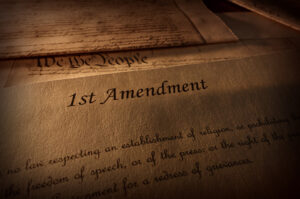By: Mark Stephenson, Esq.
The Third Circuit Rejected Lawyer’s Challenge to Pennsylvania’s Anti-bias Ethical Rule based on First Amendment Rights
 On August 29, 2023, the United States Court of Appeals for the Third Circuit reversed an East District Court’s decision striking down Rule 8.4(g) of Pennsylvania Rule of Professional Conduct, which prohibits lawyers from engaging in harassment or discrimination when practicing law.
On August 29, 2023, the United States Court of Appeals for the Third Circuit reversed an East District Court’s decision striking down Rule 8.4(g) of Pennsylvania Rule of Professional Conduct, which prohibits lawyers from engaging in harassment or discrimination when practicing law.
In 2016, the American Bar Association (ABA) adopted Model Rule of Professional Conduct 8.4(g) to advance the goal of eliminating bias in the legal profession. The rule added specifically that it is professional misconduct for lawyers to engage in conduct that “the lawyer knows or reasonably should know is harassment or discrimination” based on certain protected characteristics when practicing law. Consistent with the ABA’s goal of eliminating bias in the legal professions, many states, including Pennsylvania, adopted their own provisions prohibiting some forms of attorney bias, prejudice, harassment, or discrimination. In 2020, the Pennsylvania Supreme Court adopted Pennsylvania Rule of Professional Conduct 8.4(g), which provided that it is professional misconduct for a lawyer to, “in the practice of law, knowingly engage in conduct constituting harassment or discrimination based upon race, sex, gender identity or expression, religion, national origin, ethnicity, disability, age, sexual orientation, marital status, or socioeconomic status.”
Zachary Greenberg is a Pennsylvania-licensed attorney who regularly gives continuing legal education (CLE) presentations about First Amendment protections for offensive speech. His presentations involve quoting offensive language from judicial opinions and discussing potentially controversial topics. Attorney Greenberg fears that some members of CLE will feel his speech to be “biased, prejudiced, offensive, and potentially hateful.” Before the adoption of Pennsylvania’s Rule 8.4(g) in 2020, Attorney Greenberg sought a declaratory judgment against the Pennsylvania Disciplinary Board’s members in the Eastern District of Pennsylvania that the Rule was unconstitutional and an injunction prohibiting its enforcement. He claimed that Pennsylvania’s Rule 8.4(g) violated the First Amendment and was unconstitutionally vague.
The Third Circuit ruled Mr. Greenberg did not have standing to sue.
“To have standing to sue, Greenberg must establish he suffers an actual or imminent injury that is fairly traceable to Rule 8.4(g).” The District Court held that Greenberg had standing because his plan to “repeat slurs or epithets” or “engage in discussion with his audience members about the constitutional rights of those who do and say offensive things” was “arguably proscribed by Rule 8.4(g),” and he faced a “credible threat of prosecution” because he “demonstrated that there is a substantial risk that Rule 8.4(g) will result in his being subjected to a disciplinary complaint or investigation.”
In reversing District Court’s opinion, the Third Circuit ruled that Greenberg lacks standing to sue because he failed “to establish an imminent future injury and he faces no credible threat of prosecution for engaging in such conduct.” Greenberg also cannot prove that his assertion of ongoing chill to his speech is objectively reasonable or fairly traceable to Rule 8.4(g).
The Third Circuit underscores that Rule 8.4(g) covers only “knowingly or intentional harassment or discrimination against a person,” and therefore, does not arguably prohibit anything Greenberg plans to do. Moreover, because the Disciplinary Board members disavow enforcement for any of Greenberg’s planned conduct, Greenberg cannot establish he faces a credible threat of prosecution for his planned speech.
Is Pennsylvania’s ethical rule 8.4(g) constitutional?
Although Attorney Greenberg did not have standing, Judge Ambro, in his occurrence opinion, noted that it is uncertain whether Rule 8.4(g) will pass constitutional muster. An attorney who is disciplined under the Rule may later bring Constitutional challenges if his or her First Amendment rights are infringed by the enforcement effort.
According to an amicus brief filed in September 2022 in support of Appellants, the Pennsylvania’s Rule 8.4(g), which like ABA Model Rule 8.4(g) prohibiting harassment or discrimination by attorneys, is constitutionally sound and should be upheld.
Judge Ambro suggested the Pennsylvania rule could be amended preemptively to address alleged constitutional concerns before an attorney with standing challenges the rule.
StraightforWARD Legal Advice:
While it is not clear that whether Rule 8.4(g) of Pennsylvania Rule of Professional Conduct will pass Constructional muster in the future, lawyers should avoid disciplinary sanction by not knowingly or intentionally engaging in harassment or discrimination based upon race, sex, gender identity or expression, religion, national origin, ethnicity, disability, age, sexual orientation, marital status, or socioeconomic status.
“The practice of law” is not limited to the course of representing a client, the scope extends to “continuing legal education seminars, bench bar conferences and bar association activities where legal education credits are offered.” “Harassment” means conduct that is intended to intimidate, denigrate or show hostility or aversion toward a person based on protected characteristics. “Discrimination” means conduct that a lawyer knows manifests an intention to treat a person as inferior based on one or more of protected characteristics; to disregard relevant considerations of individual characteristics or merit because of one or more of the listed characteristics; or to cause or attempt to cause interference with the fair administration of justice based on one or more of the listed characteristics.
Ward Law’s professional liability attorneys are always available to assist lawyers in defending your legal liability cases. If you have questions, please contact Mark Stephenson at (215) 647-6614 or mstephenson@thewardlaw.com.
